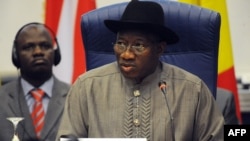ABUJA —
West African leaders agreed Sunday to formally request international military forces be deployed to Mali, where large areas of the country have been controlled by rebel groups since April.
The West African regional bloc, ECOWAS, says the group wants more than 3,000 soldiers to get ready for imminent deployment in Mali.
After three days of talks, West African leaders signed a formal agreement calling on the United Nations and the African Union to support an African-led international military intervention in Mali to take down rebel groups that control the north.
ECOWAS president Kadre Desire Ouedraogo read the agreement, saying “force may be indispensable” to take down “terrorist and transnational criminal networks” in Mali.
He said operational plans for a military invasion are firmly in place, but gives few specifics. He says most of the troops will come from West Africa, and several countries have already committed material support.
The document also calls for negotiations, but warns that rebel groups have to be committed to Mali as one nation under a secular, central government.
Ansar Dine is one of the three main al-Qaida-linked militant groups that have controlled northern Mali since April. Last week, the group said it was interested in a "frank and constructive dialogue" with Malian authorities.
In a speech earlier Sunday, the head of the United Nations office for West Africa, Said Djinnit, urged Malian authorities to speed up plans for negotiations with militant groups.
“All avenues for dialogue and negotiations with Malian rebel groups should be explored as a matter of priority to avoid as much as possible confrontation and its implications," he said.
Ansar Dine is known for its harsh interpretation of Islamic law that calls for the execution of adulterers and the mutilation of thieves. Last week the group also said it would allow humanitarian workers to operate in areas it controls.
But with several militant groups competing for power, it is not clear if negotiations with one group will produce a positive result.
Djinnit said that credible preparations for invasion could help bring rebel groups to the table. “It is also important send a strong signal to the concerned groups in northern Mali, that the window of opportunity to join negotiations shall not be open-ended," he said.
In March, a military coup toppled the Malian government. During the chaos, separatists and al-Qaida-linked fundamentalists took over the northern part of the country. Once known for tourism and democracy, Mali is now known as one of the most dangerous places on earth.
As the summit meeting in Nigeria wound down, a Malian reporter asked on behalf of the people in northern Mali if the leaders thought troops would come fast to protect them.
The answer? Negotiations continue but “nothing is definite.”
The West African regional bloc, ECOWAS, says the group wants more than 3,000 soldiers to get ready for imminent deployment in Mali.
After three days of talks, West African leaders signed a formal agreement calling on the United Nations and the African Union to support an African-led international military intervention in Mali to take down rebel groups that control the north.
ECOWAS president Kadre Desire Ouedraogo read the agreement, saying “force may be indispensable” to take down “terrorist and transnational criminal networks” in Mali.
He said operational plans for a military invasion are firmly in place, but gives few specifics. He says most of the troops will come from West Africa, and several countries have already committed material support.
The document also calls for negotiations, but warns that rebel groups have to be committed to Mali as one nation under a secular, central government.
Ansar Dine is one of the three main al-Qaida-linked militant groups that have controlled northern Mali since April. Last week, the group said it was interested in a "frank and constructive dialogue" with Malian authorities.
In a speech earlier Sunday, the head of the United Nations office for West Africa, Said Djinnit, urged Malian authorities to speed up plans for negotiations with militant groups.
“All avenues for dialogue and negotiations with Malian rebel groups should be explored as a matter of priority to avoid as much as possible confrontation and its implications," he said.
Ansar Dine is known for its harsh interpretation of Islamic law that calls for the execution of adulterers and the mutilation of thieves. Last week the group also said it would allow humanitarian workers to operate in areas it controls.
But with several militant groups competing for power, it is not clear if negotiations with one group will produce a positive result.
Djinnit said that credible preparations for invasion could help bring rebel groups to the table. “It is also important send a strong signal to the concerned groups in northern Mali, that the window of opportunity to join negotiations shall not be open-ended," he said.
In March, a military coup toppled the Malian government. During the chaos, separatists and al-Qaida-linked fundamentalists took over the northern part of the country. Once known for tourism and democracy, Mali is now known as one of the most dangerous places on earth.
As the summit meeting in Nigeria wound down, a Malian reporter asked on behalf of the people in northern Mali if the leaders thought troops would come fast to protect them.
The answer? Negotiations continue but “nothing is definite.”





